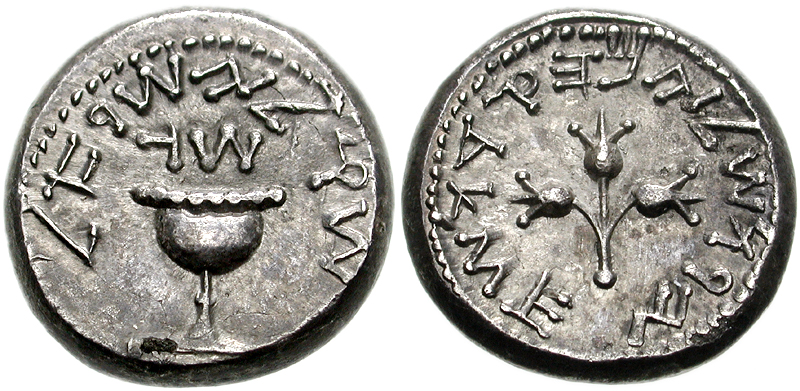This is adapted from a drash Z. S. will read this weekend at Devar Emet Messianic Congregation. A drash is a brief takeaway from the weekly cycle of texts.
This Week’s Readings:
Torah: Exodus 21:1-24:18, 30:11-16, Numbers 28:9-15
Haftarah: 2 Kings 12:1-17
Brit Chadashah: Matthew 22:15-22, 34-40
From time to time, I’ll chat about politics with someone and they’ll say “Oh, I am sure so-and-so will win.” Sometimes I’m skeptical if they’re really so sure. I like to test their purported conviction by asking them if they would bet money on the matter. More often than not, they back out of a bet. Money often gives a telling insight into a person’s values and convictions. Why am I talking so much about money? Well, today is Shabbat Shekalim, or “the Shabbat of money!” Shabbat Shekalim is the Shabbat four Shabbatot before Pesach during which Israelites would weigh out a half shekel to contribute to the Temple.
We find in the Torah portion quite a lot of tort law, and more generally laws about how members of the community ought to treat one another. The Torah portion also details the three pilgrimage festivals: Pesach, Shavuot, and Sukkot. God promises to wipe out the Canaanites as Israel enters the land, Moses ascends Mount Sinai, and the people assent to the words of Adonai. But, actually, our Torah portion does not end here. Because today is Shabbat Shekalim, we get a few extra passages. Exodus 30:11-16 explains the giving of a half shekel for the Tabernacle, and Numbers 28:9-15 commands the regularly occurring burnt offerings. God commands a burnt offering for every Shabbat and Rosh Chodesh, and He requires specific portions. On Shabbat the two flawless male lambs must be accompanied by “two tenths of an ephah of fine flour as a grain offering, mixed with oil and its drink offering.” On Rosh Chodesh, each bull must come with half a hin of wine and “three tenths of an ephah of fine flour mixed with oil; the ram with a third of a hin of wine “and two tenths of an ephah of fine flour mixed with oil”; and each lamb with a fourth of a hin of wine and “a tenth of an ephah of fine flour mixed with oil.” God gives these highly specific commands to make sure we do not wiggle our way out of our duty to give: “Do not hold back the fullness of your crops or your vintage” (Exodus 22:28). God commands a rhythmic normalcy to giving. He requires us to make giving a normal part of our life. Those who give this way know that giving is not only a value but a habit, one to be fostered from a young age.
In the Haftarah portion, Jehoash works with Jehoiadah the priest to restore the temple building after a long period of neglect and disrepair. Second Kings describes in pragmatic terms how Jehoiadah “took a chest, bored a hole in its lid, and placed it beside the altar, on the right side as one entered the House of Adonai.” In this way, people could give toward the Temple’s building fund. Some of this giving came from “the money that anyone’s heart prompts him to bring to the House of Adonai” (2 Kings 12:5), donations given in addition to the normal “money from the guilt offering and money from the sin offering” (12:17). We see here the community coming together to give beyond the norm, almost impulsively, to repair the Temple.
In the Brit Chadashah portion, Yeshua tells the Pharisees to give “to God the things that are God’s.” Yeshua may be referring to the normally expected Temple offerings, but a few verses later we learn that the greatest commandment in the Torah is to “love Adonai your God with all your heart, and with all your soul, and with all your mind.” Yeshua requires us to give our entire being to God in the act of loving God, because loving God is an all-consuming act. If we are to give “to God the things that are God’s,” then we, who belong to God, must give ourselves as a living sacrifice (Romans 12:1).
Well, I have an admission to make: At the beginning of this drash, I made an inaccurate statement. I called “Shabbat Shekalim” “the Shabbat of money.” Shekel does not actually mean money; that’s keseph (“silver”). Shekel comes from the verb shakal, “to weigh.” A shekel is a unit of weight. This ought to prompt us to ask ourselves how much weight we give God in our lives, how firm our conviction is in Him. For those of you who have prayed the sinner’s prayer: are you willing to put your whole life where your mouth is? This afternoon, let’s take some time to compare our devotion to God with our devotion to various things we care about (money, hobbies, vices, people). Do these things distract us from following God and loving Him more? Or do we care about these things because they are a means to loving God? These are serious and sometimes uncomfortable questions, but as believers, transformed by God’s grace, we must honestly evaluate our devotion to God, especially this Shabbat Shekalim. This way, when we arrive at the Temple this Pesach, we will not only have a half shekel to show God, but we can present our whole self to Him as we worship Him in His sanctuary.


Leave a Reply